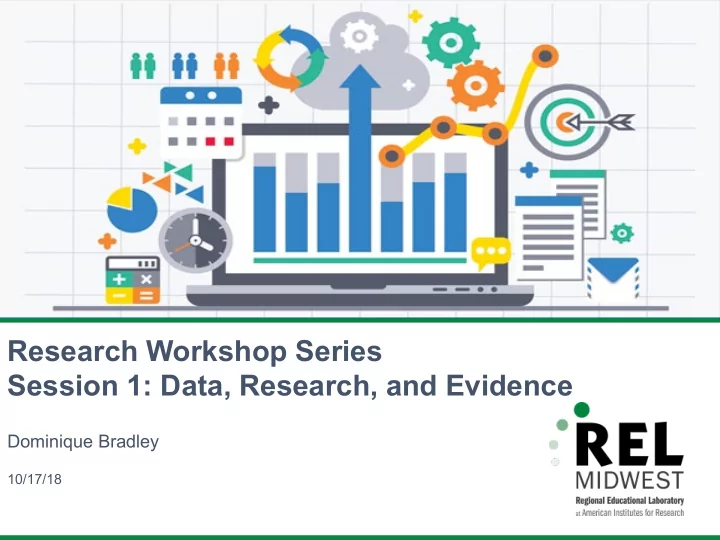

Research Workshop Series Session 1: Data, Research, and Evidence Dominique Bradley 10/17/18
Workshop Series 2018 October 17 Data, Research, and Evidence 2019 April (TBD) Reporting and Using Quantitative Data
Agenda 1. What is REL Midwest? 2. Overview of training series 3. Data collection methods 4. Types of research and levels of evidence 5. Continuous improvement model 6. Session close and evaluation
Regional Educational Laboratories
REL Midwest States
Today’s Goals 1. Discuss appropriate uses of different kinds of data collection methods 2. Overview of different types of research and levels of evidence 3. Discuss how the WI Technical College System uses data and evidence in the context of a continuous improvement cycle
Data Collection Methods
Data Collection Options
Surveys are appropriate data collection tools for many purposes …
A survey can produce quantitative descriptions of the characteristics and viewpoints of a population. •Describe current practices or behaviors •Understand attitudes •Evaluate the outcomes of a program or an initiative •Explore perceptions
Focus Groups Help formulate and pretest survey items Explore quantitative survey findings Use as a stand-alone data collection method
When to Use Focus Groups Instead of Surveys
Interviews are suitable for investigating complex or sensitive topics.
Observations 1. Planning for a Survey
Rubrics No Partial Full implementation implementation implementation 1. Blank Blank Blank 2. Blank Blank Blank 3. Blank Blank Blank 4. Blank Blank Blank
Analyzing Existing Data
Research methods can compl e ment each other in order to develop more comprehensive findings
Thinking practically…considerations for research • How does the method(s) fit your research question(s)? • What staff time and organizational resources are needed? • What is your timeline between data collection and analysis? • What are the most useful final products?
Activity 1 Work in your group to select a data collection method (or combination of methods) that would be appropriate for each data-need scenario.
Accessing Existing Research
Resources to access existing research • What Works Clearinghouse • Google Scholar • ERIC (Education Resources Information Center) • Web of Science • JSTOR • PubMed • Database of promoting health effectiveness reviews • Himmelfarb Health Sciences Database tool • Ask A REL
What Works Clearinghouse (WWC) What types of: Interventions are reviewed? • Programs, policies, practices • Academic, behavioral, student subgroups, teacher excellence, dropout prevention, postsecondary success Studies are reviewed by this clearinghouse? • Experimental and quasi-experimental designs • Qualitative research is NOT reviewed
WWC: Contextual information provided Evidence snapshots: • Summary of all research settings and samples from studies meeting standards can include: • Race/ethnicity • Gender • English learners • Free or reduced-price lunch • Delivery method • Locale https://ies.ed.gov/ncee/wwc/
Questions to consider when assessing research evidence . . . • What research methods were used? Were they appropriate to answer the research question? • Was a rigorous research design used? • What was the sample population in the study? • Are the conclusions reasonable given the research method used?
Take a Break
Research and Levels of Evidence
Different Types of Research Contribute to Our Knowledge in Different Ways
Categories of Research Common Guidelines for Education Research and Development: A Report From the Institute of Education Sciences, U.S. Department of Education and the National Science Foundation, August 2013.
Continuous Improvement Cycle
Activity 2 Work in your group to: • Identify what category of research takes place in each stage • Identify what research activities or methods you would employ at each stage
Time for Lunch!
Dominique Bradley dbradley@air.org
Recommend
More recommend